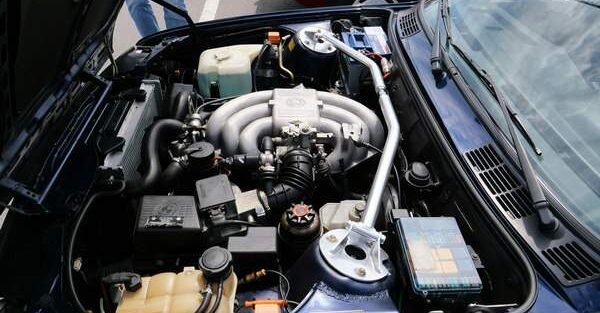Signs of engine trouble
We continue our series of publications about signs of malfunction of key components of any car. So that the car owner can independently, by the most subtle signs, understand that his car needs urgent repairs, without taking the situation to the extreme. Today we will talk about the signs of a malfunction in perhaps the most important component of a car – the engine.
In order to prevent engine repairs from costing you too much, you need to promptly pay attention to the first signs of engine malfunction and (or) its natural wear and tear. Only timely detection of an engine malfunction and carrying out a major engine repair will not only save money on the cost of repairing the engine itself, but will also save money on its spare parts, the cost of which often exceeds the cost of engine repair work.
Main signs of engine malfunction
High oil consumption
Increased oil consumption means constant topping up of oil and this is a sign of wear on the oil scraper rings and (or) oil seals (valve seals). The maximum oil consumption is considered to be comparable to the amount of oil in the engine itself from replacement to replacement for gasoline engines. For diesel engines and turbocharged engines, the norm for oil consumption (waste) is higher, but should not exceed the norm established by the manufacturer, which is indicated in the vehicle operating instructions or in the engine repair specifications.
Important advice: buy and use good quality oil. Before starting any repairs, try using engine oil from this particular manufacturer. Many car owners who experienced increased oil consumption noted its reduction.
You can also avoid costly repairs by promptly replacing oil seals, valve guides, and engine rings.
Smoky exhaust
Smoke from the exhaust pipe can be white, black, or other shades (depending on the additives in the fuel and the type of fuel itself). In this case, color serves as an important diagnostic sign and directly indicates malfunctions that have arisen in the engine. White smoke on a warm engine is 100% wear of the valve stem seals (determined by oil deposits on the spark plugs and (or) oil consumption) and (or) valve guides, and white smoke is a sign of wear of the oil scraper rings of the engine piston group (checked by measuring engine compression) .
You can avoid costly repairs by promptly replacing oil seals, valve guides, and engine rings.
Carbon deposits on spark plugs
A sign of a “rich mixture” and (or) wear of the oil scraper rings.
A rich mixture is “treated” by checking and (or) adjusting (repairing) the fuel supply system: carburetor or ECS (throttle position sensor, DBP, other sensors).
Costly repairs can be avoided by timely replacement of engine rings, or by checking and (or) adjusting (repairing) the fuel supply system. (cleaning the carburetor, identifying a malfunction of the engine ECU.)
Rough operation of the engine at idle
The engine shakes (the gear shift lever shakes). Consequence of wear of the cylinder-piston group (pressure difference in the cylinders).
There may be malfunctions of the power supply system and (or) the engine ECU.
It can be eliminated by flushing the injector (cleaning the injectors), replacing high-voltage wires, spark plugs, ignition coils, or checking and adjusting the electronic engine control system (ESC) (you need computer diagnostics of the engine, determination of fault codes, and from them identification of a faulty engine ESC module (sensor) (in such cases the “CHECK” light is usually on).
If the power supply and (or) ignition system and the ESU (electronic control system) of the engine are in order, then expensive repairs can be avoided by timely replacement of the engine rings. In this case, it is possible that the block is bored or the engine block is lined (in case of uneven critical wear of the cylinder).
Gases from the ventilation system
From the hose of the crankcase ventilation system, gas and vapors come out in time with the working strokes in the cylinders (on a working engine, gases and vapors come out without a clear pulsation of the flow.)
Wear and/or sticking of rings. Replacing the rings and decarbonizing (boring is possible) will help.
High gas consumption
During an urban driving cycle with frequent stops, gasoline consumption can double and amount to about 15 liters per 100 km.
There may be a malfunction in the power supply system or the engine control system. It can be treated by cleaning the injector, or computer diagnostics. Unless it is a fuel leak (urgently check the fuel lines, especially after replacing the fuel filter, cleaning the injector, or driving off-road).
Otherwise, replace the rings, repair the cylinder head (adjustment, replacement of valves, seats, engine boring is not excluded).
Interruptions in engine operation
The main and most common reason is dirty injectors, problems with the ignition system, or engine ECU.
It is treated by flushing the injector, determining the malfunction of the ignition system and ESU (computer diagnostics is needed).
Otherwise, a major overhaul of the engine with all the ensuing consequences: boring or liner, grinding the crankshaft (if necessary), replacing rings, possibly liners (when grooving the crankshaft). The reason is very low compression with a difference in cylinders of up to 3 atmospheres.
Knocks in the engine – extraneous noises and knocks in the engine
Knocks in the engine – extraneous noises and knocks in the car engine SHOULD NOT accompany the car throughout its automobile “life”.
Strong and weak, dull and ringing – they not only irritate the ear and reduce comfort – they indicate an inevitable overhaul of the engine with all the consequences! Any extraneous sounds indicate problems with components and assemblies (cylinder head, piston-cylinder pair, connecting rod-crankshaft pair, timing drive, etc.).
Oil pressure too low
One of the main signs of an engine overhaul.
The following malfunctions are possible:
The oil intake in the engine crankcase is clogged. Oil pump drive malfunction. The oil is too dirty, the oil viscosity does not match the season, it is old, or not suitable for the engine at all. The oil filter is clogged. Oil pressure sensor malfunction. Wear of crankshaft bearings.
The latter entails a mandatory replacement of the liners, and often grinding (grooving) of the crankshaft, resulting in a major engine overhaul.
Rough engine operation – detonation, premature ignition
Harsh engine operation – detonation, premature ignition, individual flashes in the cylinders after the ignition is turned off (glow ignition).
As a rule, there is a malfunction of the ignition system (incorrect adjustment, mainly in cars with a trumpeter) or low-quality fuel (octane number mismatch). If the car is equipped with an ECU and the check light is on, computer diagnostics is required; there is a malfunction of the engine ECU sensor.
Engine ring alignment
The cause of the occurrence is natural wear of the oil scraper rings, low-quality fuel and oil, especially its irregular replacement. Also, the reason for the occurrence of rings can be a long pause in engine operation, engine overheating, or low oil pressure.
You can try to “treat” the occurrence of rings by decoking. Helps in cases where the occurrence does not entail serious consequences associated with breakage of rings and destruction of the piston and (or) cylinder surface (the occurrence of scuffing, scratches and increased wear of the cylinder). An example of the occurrence of rings, which is “not cured” by de-bracing, see below.
Decarbonization helps 50/50. But in any case, before repairing the engine, it is worth trying to decarbonize it. The event is quite inexpensive (mere pennies compared to repairs), and it won’t hurt, that’s for sure. If you’re lucky, compression will be restored (possibly even for a long time), it all depends on how badly the engine is worn. In case of severe overheating, decoking will not help.
Engine overheating
The consequences of engine overheating are unpredictable and often do not appear immediately, but after several thousand kilometers. Here you can get away with a slight fright, or you can “get” the capital in full – depending on your luck – after all, engine overheating is a lottery.
Engine overheating can cause all of the above problems. Do not allow the engine to overheat! Especially long-term!
If engine overheating does occur, do not delay, contact a specialist, it won’t get any worse.


